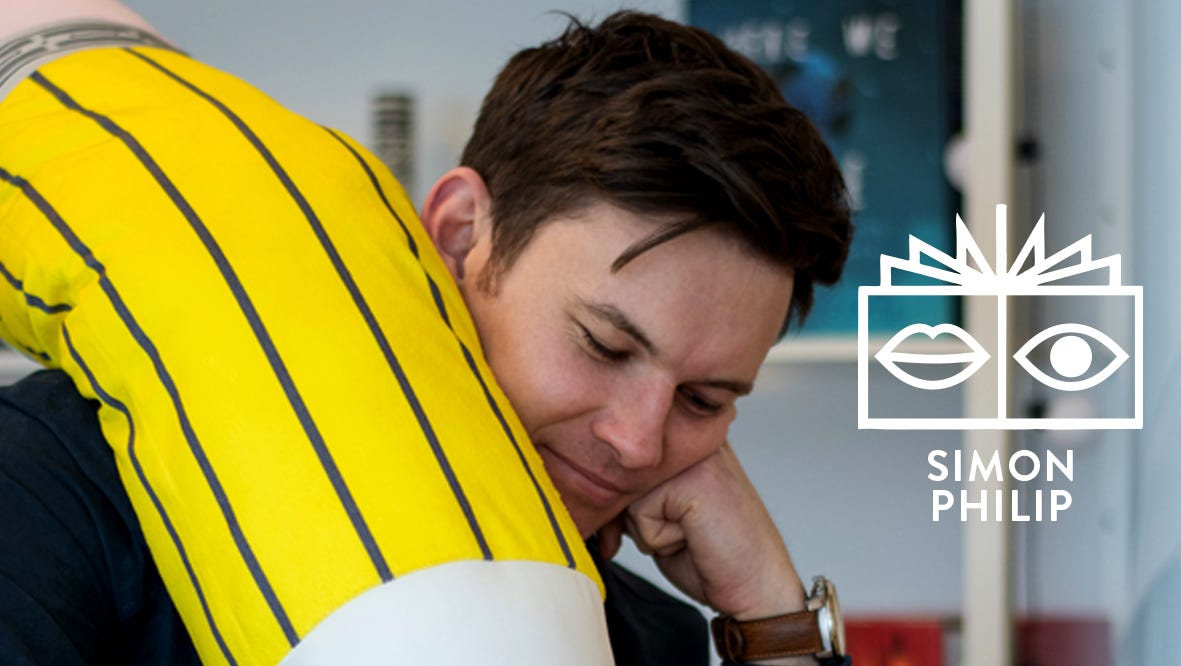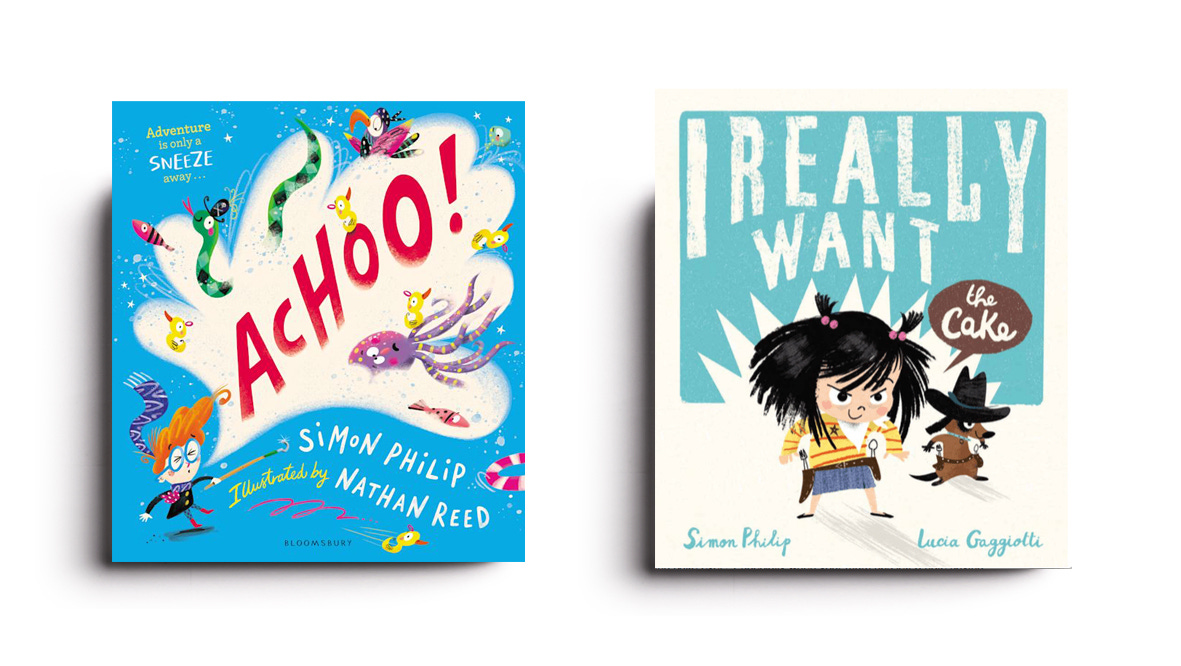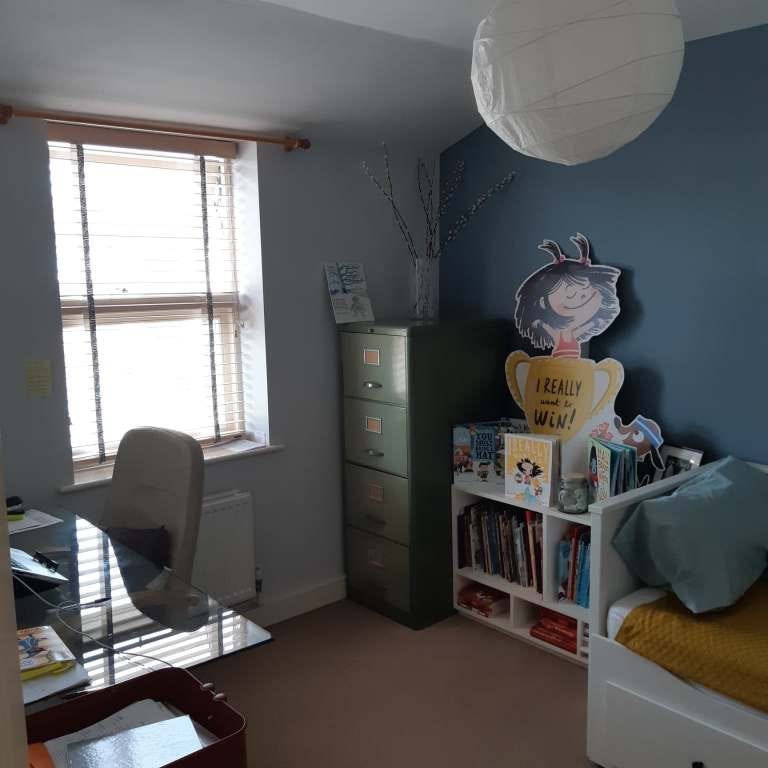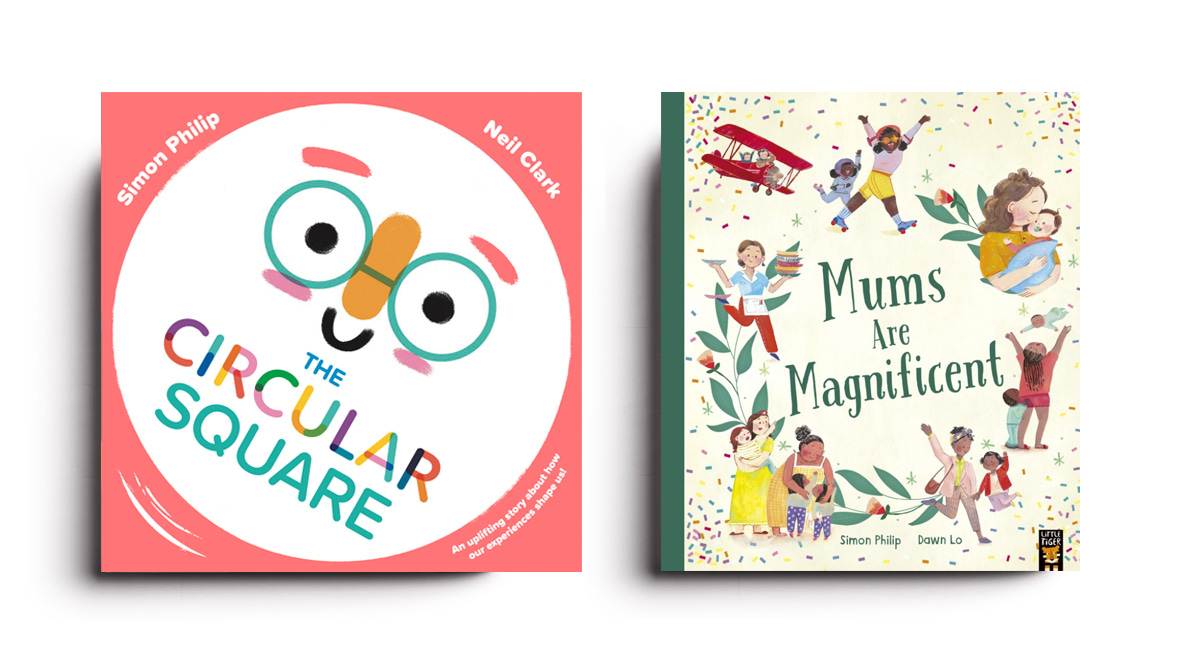Words and Pictures with Simon Philip
Award winning children's author shares his path to publication, what surprised him most about the industry and explains why he colour codes the stories he writes
To celebrate Black Book Friday, we’re offering a discount of 20% to anyone who subscribes to Words and Pictures this weekend.
Instead of buying more stuff, invest in your dreams and sign up to learn everything you need to know to about writing and illustrating children’s books for just £4 a month or £40 a year by clicking here. Offer ends 3rd December 2024.
Simon Philip is the award winning author of more than 20 books.
He is obsessed with children's books: reading them, writing them, buying them, smelling them.
His own have been published in more than 20 languages. YOU MUST BRING A HAT won the Sainsbury’s Children’s Book of the Year, I REALLY WANT THE CAKE was shortlisted for the Waterstones Children’s Book Prize, and BE MORE BERNARD was shortlisted for the Dundee Picture Book Award, the InspiREAD Primary Book Award, and the West Sussex Picture Books to Shout About! Award.
We love Simon’s books - they’re great fun to read, often hilarious, but always have a message too. I Really Want to Win was a firm favourite in our house when our boys were little.
It was great to find out more about how Simon works, where he gets his ideas from and all the spreadsheets he keeps about his writing…
Why are words and pictures important to you?
I find it mind-blowing that letters and words are simply lines and shapes arranged in a particular way on a page or screen, yet have such awesome power: to inspire or discourage, console or torment, entertain or exhaust – and so on! (The pen is mightier than the sword, and all that.)
It’s impossible to imagine a world without words, and I’m very glad that my working life revolves around experimenting with words – wrestling and playing and dancing with them. I love their rhythm and sound and feel. I have genuine fun hanging out with words!
And, of course, words are the vehicles that allow us to travel to infinite worlds for amazing adventures, without actually travelling at all.
I suppose pictures are alright, too…
How did you go from having an idea for a story to getting your first book published?
I first began writing with the intention of being published in May 2013, after withdrawing from a Primary PGCE. The initial batch of picture book texts I sent to agents were OK, but with hindsight I can see that I submitted these too soon; they weren’t polished or commercial or good enough, and I was yet to discover my ‘voice’.
Every agent I’d approached rejected those texts, but, that October, I wrote two stories – I Don’t Know What to Call My Cat and I Really Want the Cake – which instantly felt much more ‘me’. After a further (and very prompt) rejection from an agent I’d previously approached, I submitted these new texts – along with a much-improved cover letter – to Sallyanne Sweeney, who became my agent a couple of weeks later.
She managed to sell both texts to separate publishers – Cat first, Cake later – but my debut picture book ended up being You Must Bring a Hat (illustrated by Kate Hindley), the contract for which was the second I signed.
Is there anything about the children's industry that surprised you when you had your first book published?
I perhaps underestimated the time it takes to make a book, and I was naïve in thinking that an editor’s love of a text is pretty much all that’s needed for it to be acquired: I wasn’t aware just how many stages and meetings a text goes through – and how many teams have to back it – before a publisher offers for it.
And I’ll be very honest here and say that I’m still surprised after 10+ years in the industry by the lack of responses to submissions – silences, I call them – from publishers. I’m aware that staff at publishers work extremely hard and are stretched very thinly, and are inundated with submissions.
They are also invariably lovely people. Nevertheless, I think a sort of template rejection (in the style of literary agencies’) from publishers that can be sent to agents/authors at the click of a button would do an awful lot for authors’ mental health – I know it would for mine.
Authors know that constant rejection is simply part of the job. The ‘no’ responses are disappointing, but expected, and easy to move on from. But the ‘no response’s – well, personally, I find those much more difficult to deal with.
Not knowing whether a publisher has even read a submission can be maddening. Obviously, after a certain point, one has to assume that a ‘no response’ to a submission is a ‘no’ – but there’s always that lingering hope and possibility that, actually, it simply hasn’t been read yet. And, in my experience, that does happen.
Did you always want to be an author? Or did you ever want to be something else?
Growing up – and even into my twenties – I never really knew what I wanted to do as my job. Despite loving books, reading and writing as a child, it never really occurred to be that being an author was an actual job, that people got paid for writing stories.
I had a brief stint as a 5-to-7-year-old when I wanted to be a fireman (Fireman Sam, to be exact), as implied by this photo:
But then I grew out of that outfit (and fantasy). As a sports-loving child, I’m sure at some stage I’d have said I wanted to be a professional footballer or cricketer, but, lacking the requisite talent, that was never a realistic ambition for me: I may as well have aspired to be a dinosaur. Or doorknob.
I studied History and Ancient History at university, then put my skills to good use working as a barman in a local pub. After a year, I grew tired of the owner calling me Andy, and so, naturally, decided to become a primary school teacher.
I think, deep-down, I knew quite early on that I wasn’t cut-out for the rigours of teaching, but my PGCE rekindled my love of children’s literature, particularly picture books, so much so that I was inspired to write some myself. But it was only after quitting my teaching degree that I finally realised that I wanted to be an author.
Is making children's books your full time job? Has it always been your full time job or have you done any other work alongside it?
Writing’s been my full-time job since August 2021. Before then, I worked in hospitality, gradually reducing my weekly hours as my writing income increased. Then Covid hit, and I was furloughed – which proved to be a great opportunity for a trial run of writing full-time (without the stress of depending entirely on writing for my income, I should add).
I was lucky to have that opportunity: I’m not sure I would have taken the leap into full-time writing had I not proven to myself that I have enough ideas and motivation to do it! In terms of number of texts written, 2020 and 2021 were more productive than previous years by far.
It was also a case of If I really want this to be my career, I have to properly commit to it at some stage, so why not now? And, in truth, I was desperate to leave my hospitality job by the end. Working in hospitality can be great fun up to a point, but it also does something sad to the soul after a while, if it’s not where you want to be.
Having said that, I’ve found writing full-time more difficult than I expected. I think having a job on the side is probably healthier – mentally, emotionally, financially, and even creatively, sometimes. Writing full-time is great in many ways. It’s also really hard. And sometimes it’s terrifying. I’m probably a complete idiot for wanting and trying to do it!
You wrote a post on your substack recently where you shared details of all the books which you've submitted and which then led to book deals. We’re in awe of your organisational skills and are curious to know more about what you've learned from keeping these notes. Can you tell us more about this?
Haha, thanks! If it makes you feel any better, it’s about the only part of my life which is organised. Although I do also keep a record of what I’ve written and when (e.g. the date I started and finished writing the story).
I was once told by an editor that 10% is a fairly good hit rate in terms of acquisitions, i.e. if you write 10 texts, and 1 gets acquired, you’re doing well.
Part of the reason I keep these records is so that I can measure myself against that – which is probably really dim of me, as quality is obviously just as important as quantity, and there are so many factors that affect whether or not a text is acquired.
But I colour code the list of stories I’ve written to reflect interest from publishers: red for rejected, green for acquired, and blue for texts that went to further meetings/acquisitions but weren’t acquired. This gives me a quick visual overview of my hit-rate and which texts most appealed to publishers, and I find it motivating to be able to see clearly my level of productivity, and to try to improve it year-on-year.
Don’t worry, though: I am aware I’m a maniac.
Where do you work?
Here’s a photo of where I used to work, the second bedroom/study in my flat in Chichester:
But I’ve been living in Brighton for the last year with my partner (our daughter soon turns 1) and, at the moment, don’t really have a dedicated work space. There’s a small table in one of the bedrooms though, which is where I tend to plonk my laptop – and, sometimes, I even open it and write!
I’d love to be able to work anywhere (i.e. cafes, libraries etc), but I get too distracted by people watching and noise to concentrate. So I need somewhere quiet, where I’m unlikely to be interrupted.
Do you have a work routine? If so, can you tell us about it?
A routine? What’s that?!
Oh, yes, I remember. The answer to your questions is no, so no.
I certainly haven’t had a routine since the arrival of my daughter – and I’ve done much less writing than normal this last year – but I think that’s to be expected, and it’s not as if I already had a well-established one.
When I’m mid-project or know the idea that I’m going to work on next, I try to be fairly disciplined, ideally aiming for normal-ish working hours. I often find that my feeble brain has a limit of about six hours’ creativity/writing time before it turns to mush, though, so my working day at my desk/laptop, doesn’t really compare to normal working hours, if there is such a thing anymore.
What are the best bits and the hardest bits about creating children's books?
One of my favourite things is seeing what illustrators do with my words, how they bring my stories to life. I’m in awe of all the illustrators I’ve worked with (and illustrators generally).
Although I have a visual mind in the sense that I’m able to distinguish and outline which parts of a story could best be told through the artwork (and I always think carefully about the interplay between text and illustrations), I’m not great at visualising what my stories could or should look like on the page. So I LOVE seeing the artwork at its various stages; it’s a treat to receive artwork updates in my inbox. As are lovely reviews from young readers!
I also love the problem-solving aspect of writing in rhyme. I can spend hours and hours trying to find the best possible combination of words for a line, which can be frustrating – but when I finally find them, and the line I’ve written rolls off the tongue with a wonderful rhythm, it’s a great feeling.
Although I treasure the flexibility that self-employment affords me – it’s a massive and convenient perk – not having a predictable income is tough (my choice though, I know). And, unpredictability aside, it’s a very challenging way to try to earn a living.
It’s also hard to escape the feeling sometimes that, aside from trying to write as many texts as possible, I have limited control over the trajectory of my career! A lot depends on luck and timing and many other factors over which one has no influence. Writing generally is a bit of an emotional rollercoaster.
Where do you get your ideas from?
Funnily enough, I answered this exact question in detail on my Substack very recently, as it’s the one I’m probably asked most often. But in short, I don’t really know! Everywhere and anywhere, I suppose.
I wish I was always bursting with ideas, but the truth is that I constantly fear I’ll never have a decent idea again. So far, I always have – eventually – but one of the things I find most difficult about writing is having to constantly generate new ideas.
I come up with many fragments of ideas, but tend to dismiss them too quickly if the rest of the idea doesn’t reveal itself to me pretty promptly. I consider that one of my flaws as an author; I should be able to work on those fragments until they become something whole, but I lack the patience and enthusiasm to do so.
Can you tell us what you're working on now?
I recently received an offer for picture book text about gratitude, so I’m sure I’ll have revisions to make to that soon. Other than that, I need to write a text to fill a slot in a contract I signed years ago – which had been filled, but my publisher’s plans changed!
What advice would you give someone who wants to write their own children's book?
Read, read, read! That’s the advice that every author gives, but for good reason.
Then, write, write, write – to discover, develop and hone your voice.
Listen to feedback, but remember that it’s subjective, so don’t take it as gospel: it’s important to trust your gut – and selftoo. A deep well of self-belief (and resilience, and passion, of course) is vital to finding a way to continue to write in the face of the constant rejection and disappointment that comes with the territory of being an author.
Lastly, try to enjoy the writing process: it’s the only bit you truly control. So write for you. When I’m out of inspiration and motivation, I always try to write something I know I’ll have fun with – it helps me remember why I chose to be a writer in the first place!
You can find out more about Simon on his website, instagram and Bluesky.
Simon also has a brilliant substack Authorly Honest where he gives ‘you a warts-and-all insight into the writing, feelings, finances and life of a children’s author’ crucially, ‘without breaching his contracts’. (Always a good idea).
We hoped you enjoyed reading Simon’s answers as much as we did. We interview a different children’s author, illustrator or publishing professional every Friday. To make sure you never miss a post, subscribe below.
Love Naomi and James x












Thanks so much for having me on your Substack, Naomi and James! 🙏